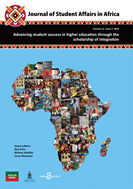Using action and grounded theory techniques as evidence-based design for an academic advising programme
DOI:
https://doi.org/10.24085/jsaa.v12i2.5452Keywords:
Academic advising, action research, grounded theory analysis, evidence-based intervention designAbstract
Academic advising, if done effectively, can play a significant role in supporting student retention. However, as a relatively new field in South Africa, there is limited, locally contextualised, research into advising interventions and their effectiveness. We therefore need evidence-based approaches that will lead to more intentionally structured, and shareable practices that meet the needs of our context. With this paper we detail a methodology through which we were able design an evidence-based, academic advising programme which, we argue, is both effective and academically rigorous. We show how we used the principles of action research, supported by grounded theory analytical techniques, to develop a programme for students facing exclusion at SAU. We collected feedback in cycles, where the student ‘voice’ from one cycle (n=352), informed the design of the next cycle. Programme evaluation data (n=122) from a third cycle was used to assess the effectiveness of this approach. The results indicate a positive association of the new capability developed in students, with the designed learning activity. This suggests that the approach was effective. The method we describe has application across a wide variety of student development initiatives and can support effective, intentional design and sharing of such practices.
Downloads
Published
Issue
Section
License
Copyright (c) 2024 Riashna Sithaldeen

This work is licensed under a Creative Commons Attribution-NonCommercial-ShareAlike 4.0 International License.
Authors who publish with this journal agree to the following terms:
Authors retain copyright and grant the journal right of first publication with the work simultaneously licensed under the Creative Commons Attribution Share-alike 4.0 International License that allows others to share the work with an acknowledgement of the work's authorship and initial publication in this journal.
Authors are able to enter into separate, additional contractual arrangements for the non-exclusive distribution of the journal's published version of the work (e.g., post it to an institutional repository or publish it in a book), with an acknowledgement of its initial publication in this journal.
Authors are permitted and encouraged to post their work online (e.g., in institutional repositories or on their website) prior to and during the submission process, as it can lead to productive exchanges, as well as earlier and greater citation of published work (See: The Effect of Open Access).


